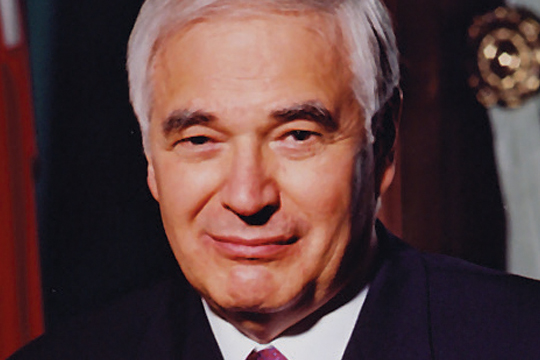
Diplomat, lieutenant-governor and author: James Bartleman has led a life of many chapters and accomplishments.
At 82, James Bartleman can look back on a life of intense productivity.
Born in immense poverty, aware through most of his life of the contempt many felt for his Indigenous background, he rose to become the lieutenant-governor of Ontario and is now, for the rest of his life, the Honourable James K. Bartleman.
But there’s more to his resumé than his five years as Ontario’s vice-regal representative. For 35 years, he worked as a Canadian diplomat, serving as high commissioner or ambassador to many countries, including South Africa, Cuba and Israel and completing postings on six continents — a rare distinction. Universities have conferred 13 honorary degrees on him. He is a member of the Order of Canada and the Order of Ontario. And for many years, he’s turned out novels and non-fiction books, an activity that continues to this day, as he looks for a publisher for what will be his 10th book.
He grew up as a member of two worlds. His mother, Marie Simcoe, was Chippewa, from the Mnjikaning First Nation, near Orillia, Ont. His non- Indigenous father, Percy Bartleman, was a labourer and sold fish to restaurants. When the family was living in Port Carling, Ont., they spent summers in a tent and winters in a ramshackle house with no modern conveniences.
It was not easy being of mixed heritage. Bartleman remembers being called a “dirty half-breed” throughout childhood. That left marks, including a tendency to depression about which he has spoken and written candidly.
In the summers of his teenage years, Bartleman worked for a rich American industrialist, tending the grounds of his Muskoka cottage, not far from the boy’s Orillia home. Something in him impressed the man, who summoned Bartleman and told him that he’d heard good things about his progress in high school. “I said, ‘Yes, I’m doing reasonably well’ — but I didn’t mention that there were only four of us in Grade 12.”
The industrialist offered to pay for the boy’s education, and Bartleman was soon studying history at London’s University of Western Ontario (now Western University.) He graduated with an honours degree in 1963.
In 1966, Bartleman pursued joining the foreign ministry. It only accepted the top one per cent of candidates, but he made the cut.
After several postings abroad, he became prime minister Jean Chrétien’s foreign policy adviser in 1994. He recalls Chrétien as “a wonderful person,” someone with whom he still keeps in touch. When Bartleman later wrote an account of his years with Chrétien, he was allowed to use Chrétien’s own papers for research.
In 2002, Bartleman was named Ontario’s 27th lieutenant-governor. He chose three initiatives for his time in office — fighting racism, promoting Indigenous education and literacy and working to reduce the stigma of mental illness.
On his vice-regal tours of Northern Ontario, Bartleman discovered Indigenous children had limited access to books, so he established a book drive that continues to this day, with more than two million books delivered to schools and libraries.
Some of those books may well be his own. Since 2002, he’s written a series of memoirs of his career, as well as novels that often explore the difficulties of growing up Indigenous in Canada. Many have been Canadian bestsellers.
For the past 45 years, he has shared his life with his Belgian wife, Marie-Jeanne Rosillon. They currently live in London, Ont. They have three accomplished children — two lawyers and a physician.
At 82, Bartleman knows that he’s nearing the end of his particular road. He would like to see more improvement in relations between Indigenous people and larger society, but achieving that goal is a project for younger people.
“At my age, I can no longer do what I used to do. I’m not giving up my dreams, but I now have to leave the heavy lifting to others.”
Bartleman has been a member of Federal Retirees since 2002. “I’m all in favour of the association,” he says. “I wish them the best of luck.”

